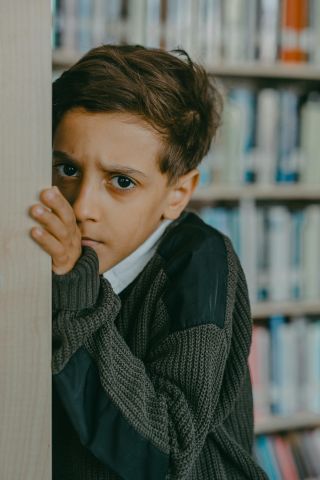The Fate of Children with Psychopathic Mothers
When we think of a mother, we think of unconditional love, warmth, honesty, and compassion—someone who is inviolable. But what about the psychopathic mother? What can her children expect?

Children of psychopaths are an “inconvenience”
In very blunt language, preeminent psychopathy expert Dr. Robert D. Hare states, “Psychopaths see children as an inconvenience.” He continues, “Indifference to the welfare of children – their own as well as those of the man or woman they happen to be living with at the time – is a common theme in our file of psychopaths.”1 He refers to the case of Diane Downs as an extreme example of how this indifference manifested in homicide.2
Diane Downs: a homicidal mother with high levels of psychopathic traits
Diane Downs was convicted of shooting her three children, killing one of her daughters, and permanently disabling her two other children. In the book Small Sacrifices, Ann Rule writes, “Her kids seemed like a pain in the ass to her … she felt that kids were inferior … .”3 Downs did the shooting because her then boyfriend did not like having children around.
During the course of Diane Downs’ trial that led to her imprisonment, she was found to be neglectful and abusive to her children, leaving them emotionally scarred. Her eldest daughter Christie testified at her trial that her mother had done the shooting. Christie had remarked that “her mother didn’t love the family…and after the shootings, said sadly, ‘Mom didn’t even say ‘I’m sorry.’” 4
Most parents with high levels of psychopathic characteristics are not murderers in the physical sense, but the emotional turmoil and psychological trauma they cause can leave deep and long-lasting scars. According to psychopathy researcher Dr. Carl Gacono, “The psychopath’s relationships are not based on warmth and affection but rather power and control.”5
Analysis of many situations involving psychopathic mothers has led researchers to note how they use their children as part of schemes to manipulate others. “Often, they will use their children as a means of deflecting responsibility and getting others to feel sorry for them and profess a deep connection to their children despite very limited evidence to support their assertions.”6 They use their children so they can manipulate others, and upon investigation, many times they actually had no children or had long been separated from them.
As they are in life, so they are at death in interactions with adult children
Growing up as a child with a mother who displayed severe psychopathic traits, I witnessed first-hand these manipulations. My mother often used me as a prop to beg others for favors and gain attention for herself. Throughout my childhood and my adult life, I experienced extreme and severe emotional and psychological abuse. This continued unabated throughout my mother’s life and was even profoundly evident in her final months. A brief outline of our last interactions will be instructive.
For about 10 years, I had gone “no contact” with my mother because of the turmoil she inflicted on me and my family’s well-being. An incident when she attempted to have me and my husband wrongfully arrested was the cause. About 10 years thereafter, my mother called me. She sounded distraught and said that she was sick. In rapid sentences, she told me her lungs were bad and that she was on oxygen. She kept repeating she wanted to “start a new page.” She told me, “What I did was then, and this is now.” She also told me, “You are my baby.” She went on to say that I had always done the right thing by her. She said she did not know how to fix what she did, but that we had to “start a new page.”
My whole family, including my children and husband, dropped everything to visit with her after the call. When we were a short distance away, she called and asked whether we could come some other day instead. Some friends were going to drop in. We told her we were coming anyway since we were only a few minutes away.
The telephone kept on ringing while we were there, and she ignored us. She was alert, receiving calls, laughing and chatty. On subsequent visits, I noticed new and different people were on their way to serve her needs – bringing her goodies and even propping up her pillow. Each person was fresh entertainment and she easily manipulated them to do her favors.
A few days before she died, I stopped by to see her at her house. My mother was visibly annoyed that I should arrive while some relatives were present. She had poisoned them against me for many years. After I kissed her, she loudly said two words that still ring in my ears: “Go home!” No remorse, no regrets.
As she had been in her life, so she still was at death – a bitter, mean and manipulative user of people who enjoyed hurting people when it suited her.
When I spoke with Dr. Hare at a conference that year, he said psychopaths stay psychopaths as they age.7 Just like my mother, they die as they live.
References
1. Hare, Robert D. (1999). Without Conscience: The Disturbing World of the Psychopaths Among Us. (New York, NY: The Guilford Press). 63.
2. Hare. 52 – 53, 62 – 63.
3. Rule, Ann. (1988). Small Sacrifices. New York, NY: New American Library – Signet. 130.
4. Rule. 422.
5. Gacono, Carl (2013). Foreword. In Winifred Rule, Born to Destroy. (p. ii). Russian Federation: Ministry of Health.
6. Smith, Jason M., Gacono, Carl B. & Cunliffe, Ted B. (2021). Understanding Female Offenders: Psychopathy, Criminal Behavior, Assessment, and Treatment. Cambridge, MA: Academic Press. 458.
7. Video of Robert D. Hare taken at Society for the Scientific Study of Psychopathy 8th Biennial Conference, Las Vegas, Nevada. May 2, 2019. Video located at Blog | Winifred Rule (winisbooks.com), video published May 26, 2020 as “Psychopaths Always Stay the Same.”